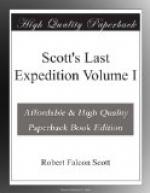Yesterday afternoon it became darkly overcast with falling snow. The barometer fell on a very steep gradient and the wind increased to force 6 from the E.N.E. In the evening the snow fell heavily and the glass still galloped down. In any other part of the world one would have felt certain of a coming gale. But here by experience we know that the barometer gives little indication of wind.
Throughout the afternoon and evening the water holes became more frequent and we came along at a fine speed. At the end of the first watch we were passing through occasional streams of ice; the wind had shifted to north and the barometer had ceased to fall. In the middle watch the snow held up, and soon after—1 A.M.—Bowers steered through the last ice stream.
At six this morning we were well in the open sea, the sky thick and overcast with occasional patches of fog. We passed one small berg on the starboard hand with a group of Antarctic petrels on one side and a group of snow petrels on the other. It is evident that these birds rely on sea and swell to cast their food up on ice ledges—only a few find sustenance in the pack where, though food is plentiful, it is not so easily come by. A flight of Antarctic petrel accompanied the ship for some distance, wheeling to and fro about her rather than following in the wake as do the more northerly sea birds.
It is [good] to escape from the captivity of the pack and to feel that a few days will see us at Cape Crozier, but it is sad to remember the terrible inroad which the fight of the last fortnight has made on our coal supply.
2 P.M.—The wind failed in the forenoon. Sails were clewed up, and at eleven we stopped to sound. The sounding showed 1111 fathoms—we appear to be on the edge of the continental shelf. Nelson got some samples and temperatures.
The sun is bursting through the misty sky and warming the air. The snowstorm had covered the ropes with an icy sheet—this is now peeling off and falling with a clatter to the deck, from which the moist slush is rapidly evaporating. In a few hours the ship will be dry—much to our satisfaction; it is very wretched when, as last night, there is slippery wet snow underfoot and on every object one touches.
Our run has exceeded our reckoning by much. I feel confident that our speed during the last two days had been greatly under-estimated and so it has proved. We ought to be off C. Crozier on New Year’s Day.
8 P.M.—Our calm soon came to an end, the breeze at 3 P.M. coming strong from the S.S.W., dead in our teeth—a regular southern blizzard. We are creeping along a bare 2 knots. I begin to wonder if fortune will ever turn her wheel. On every possible occasion she seems to have decided against us. Of course, the ponies are feeling the motion as we pitch in a short, sharp sea—it’s damnable for them and disgusting for us.




